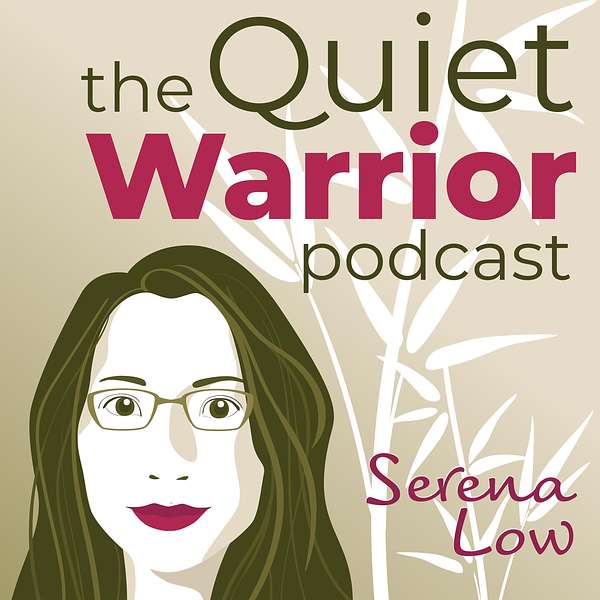
The Quiet Warrior Podcast with Serena Low
Are you an introvert who wants to be more and do more, beyond what’s safe, comfortable, and pleasing to others?
Your host is Serena Low, and her life’s purpose is to help quiet achievers become quiet warriors.
As a trauma-informed introvert coach and certified Root-Cause Therapist, Certified Social + Intelligence Coach, and author of the Amazon Bestseller, The Hero Within: Reinvent Your Life One New Chapter at a Time, Serena is passionate about helping introverts and quiet achievers grow into Quiet Warriors by minimising:
- imposter syndrome,
- overthinking,
- perfectionism,
- low self-worth,
- fear of public speaking, and other common introvert challenges.
Tune in every fortnight for practical tips and inspirational stories about how to thrive as an introvert in a noisy and overstimulating world.
The Quiet Warrior Podcast with Serena Low
21. How introverts can awaken The Warrior Light in their voices (with Dominique Oyston)
In this episode, Serena and Dominique Oyston discuss:
- Why more introverts need to speak up and share their stories, their intuitive gifts, and their voices
- Negative beliefs and traumas that hold introverts back from growing
- What archetypes are and how they help us in our personal growth journey
- How the warrior archetype helps introverts access courage and take inspired action
- How to develop the skills you need to deliver and share your message even if performing and speaking are not your innate nature
- How Dominique helps women find the light in their voices and learn who they are, so they can speak their truth confidently and shine their spirits through their voices
Guest Bio:
Dominique Oyston is an international soprano, voice and performance mentor and visionary at the leading edge of the awakening voice of the Feminine.
Dominique's unique intuitive vocal skills evolved within her professional operatic career, alongside years of training in Yoga, Steiner teaching, sound healing and in dance, acting, mythic history, body language and archetypes.
After a 20 year international career, Dominique founded the Goddess Voice Academy, a global teaching to return feminine wisdom of the voice, banished since ancient times, to the public speaking arena. Dominique supports conscious leaders to embody the creative power and potential of their full spectrum voice.
Resources and Helpful Links:
Goddess Voice Academy: https://www.goddessvoiceacademy.com/
Join Dominique’s online community:
FB page: https://www.facebook.com/goddessvoice
FB Group: https://www.facebook.com/groups/327329514332337/
Ways we can connect further:
- Join my facebook community: Global Introvert Network
- Connect on instagram: @serenalow_quietwarriorcoach
- Have a meaningful conversation on LinkedIn: https://www.linkedin.com/in/serena-low/
This episode was edited by Aura House Productions
Transcript – Interview with Dominique Oyston
Ah, it's a pleasure. I'm really looking forward to this conversation.
I think that's that's the challenge I feel that a lot of introverts have.
And that is not really natural for the introvert nature. We're not broadcasters of who we are.
Am I making sense with that idea?
It is valuable and it is relevant, and there's almost like this is where the warrior comes in.
Yes, to face our fears and to overcome them and do that deliberate work.
They're tools that that help us self-identify and take action based upon that self-identification.
Yeah, we have this incredible range that we can simply switch on.
I know. In a way, it's absolutely ridiculous, isn't it? Oh, yeah, I'll just go and speak my truth.
And so I think the starting point really is to know the self.
So the next step is to really nail down the message, the core piece of teaching.
You combine that with “This is my identity. This Is who I am.”
We're starting to understand that this is exciting. It is an exciting frontier.
What's the source of you, your vulnerabilities, your stories, your knowledge, your authority?
I have to find that out first before I can share that with an audience, yeah.
Exactly. Exactly. I love that because that is something we can all do today.
So I can do that now, but it's taken a long time.
One of the things a warrior does is the ability to defend yourself.
And so we have to practise. The voice is this Instrument. It's a little bit like, use it or lose it.
A few more times until it feels more true.
Like if I pick my voice up into my front resonators next to my nose that it changes my voice.
And if I pull my larynx back and drop it slightly low, that changes the tonality of my voice.
But I like to go to the physical first.
And bring everything, bring the body back into homeostasis.
And then there's the experience of this lifetime.
And so those 3 components, all you know, they're all in there.
And it's in our body. And so you talk about the self-love.
Just no, I didn't want to say that.
It's not perfect, but this is good. I'm where I actually need to be.
Yes, I I really appreciate what you said about not looking back, and also about being realistic.
So I know that I've got a certain amount of charge in the morning and so I do the interview.
We have to say no, I can't stay up late tonight.
I think the introvert, I think that women generally underestimate their power.
I think there's an incredible amount of self-doubt along the way.
I work with introverts - pretty much all the people I work with now are introverts.
But simply to walk through the world, being that light, being that power, being that magnificence.
And then do the work to build the messaging. But however long it takes is however long it takes.
That sort of messaging. Does that make sense?
It makes so much sense, it makes so much sense.
Thank you, Serena. It's been an absolute pleasure.